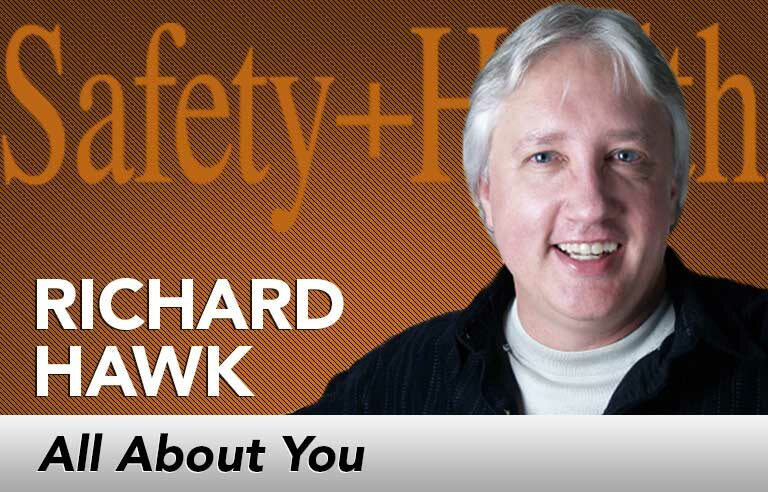All About You: Getting a grip on fear

EDITOR’S NOTE: Motivating employees to work safely is part of the safety professional’s job. But who motivates the motivator? In this monthly column, veteran safety pro and professional speaker Richard Hawk offers his entertaining brand of wisdom to inspire safety pros to perform at their best.
Fear can save your life. It’s a protective emotion that humans have developed to survive. But fear also can cause harm, physically and mentally. For example, phobias – defined as “persistent, irrational fears of certain objects or situations” – can ruin a person’s social life, in some cases causing them to never leave their home.
For most of us, our fears aren’t so severe that they disrupt our daily lives. Still, fear is unpleasant and can mar your happiness – or even affect your career as a safety professional – if you let it hold you back from pursuing a promotion or goal.
For more than 25 years I’ve been practicing ways to control my negative emotions, including fear. I include these tactics as part of my seminar and talks on stress. Many attendees have said that my tips have made a difference in their lives, so I’d like to share some ways to better handle fear.
Remind yourself it will pass
When you feel anxiety, it usually peaks and then diminishes. Telling yourself that the fear you’re feeling will go away (and it always does) can calm you. When we’re experiencing a strong negative emotion, we tend to believe it will stay for a long time, but that’s not true.
Once the fear is gone, if you think back on how it felt, you’ll realize it probably wasn’t as bad as you made it out to be. You can use that realization to quell its power the next time you’re afraid.
‘No big deal’
If doing something frightens you, like giving a presentation, remind yourself that nothing horrible happened the last time you stood in front of an audience. No doubt you’ve heard that many people’s fear of public speaking is stronger than their fear of dying. Even if you make mistakes, audiences tend to be forgiving, so it’ll probably be “no big deal.”
Before I spoke in India for the first time a few years ago, I was excited but also apprehensive. I kept reminding myself of how many times I’ve traveled abroad safely and that I’ve had people from all over the world in my audiences. These reminders were reassuring. Although a few nerve-racking things happened, none was harmful. Overall, it was a rewarding experience.
Is it significant or likely?
According to the Statistic Brain Research Institute, 90 percent of the things we fear are “considered to be insignificant issues.” The institute also states that 88 percent “are things feared about health that will not happen.” Although this doesn’t always work, it can help if you discover something you fear is insignificant or rare. Learning that there is only one plane crash per 1.2 million flights still may not take away all of your fear of flying, but it could reduce it.
What’s the best that could happen?
Is fear holding you back from reaching out for a new position or making some other change? If so, try thinking about “the best that could happen” instead of the worst. If the fear of failure is dominating your mind, pay attention to what you’re saying to yourself. Thoughts come and go quickly, and you could be scaring yourself without even realizing what’s causing it.
Sometimes our self-talk is ridiculous and unrealistic. If you examine why you’re afraid, you may even realize that what you’re thinking is silly. For years, my heart would speed up and I’d be nervous when going through customs. When I started noticing my thoughts about the ordeal, I realized I was thinking about worst-case scenarios that rarely happen to someone who isn’t doing anything criminal. Now, I calmly hand over my passport.
Fear isn’t fun (unless you’re watching a scary movie!), but it is necessary. It’s when it does harm or holds us back that we need to control it. I’m confident these techniques will help you do that.
Richard Hawk helps companies around the world create more vibrant safety cultures by showing them how to make safety fun. As a professional speaker, author and musician, he also inspires employees to focus better and enlightens safety leaders about ways to increase their influence. To learn more about Richard, visit www.makesafetyfun.com.
Subscribe to the podcast feed in iTunes
Post a comment to this article
Safety+Health welcomes comments that promote respectful dialogue. Please stay on topic. Comments that contain personal attacks, profanity or abusive language – or those aggressively promoting products or services – will be removed. We reserve the right to determine which comments violate our comment policy. (Anonymous comments are welcome; merely skip the “name” field in the comment box. An email address is required but will not be included with your comment.)

